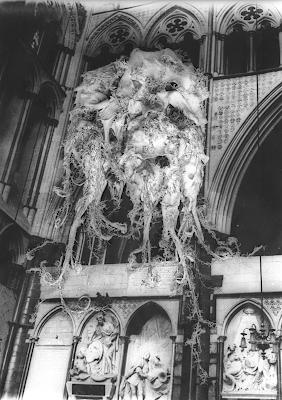WARNING: These comments contain SPOILERS.
 Click for a better jpeg.
Click for a better jpeg.
Critics and viewers alike have praised PUSS IN BOOTS: THE LAST WISH, and at
least from comments online, the most notable character in the film has turned out
to be the enigmatic Wolf. I can see good reasons for this.
The Wolf lacks a complex personality; much of his impact, instead, owes to the surprise of his unsettling presence in a film for children. His brutality and scorn bring a genuine chill to the narrative, but for all of the pleasure he takes in cruelty, he operates from clear motives; he follows a harsh yet moral code of honour, despite a personal resentment that, he admits, drove him to bend the rules -- "Sh! Don't tell!" This paradox of sadism held in check by principle becomes the key to his actions.
Another part of his fascination is the role he plays. The
film sets him up as the enemy who cannot be defeated, and to its credit,
solves the problem he poses without any last-minute twists or turns, which
makes his final confrontation all the more haunting.
All of this can be recognized with one viewing of the film, but watching it
again, I noticed two elements that took me by surprise.
 Click for a better jpeg.
Click for a better jpeg.
Consider how much the Wolf has in common with Perrito:
Both make a first appearance in disguise, and are mistaken for something else.
Perrito seems to be a cat; the Wolf appears to be a bounty hunter.
Both become unwelcome pursuers. Puss In Boots eventually begins to like
Perrito, and eventually comes to respect the Wolf.
Both give back to Puss In Boots the sword that he has left behind, even if
Perrito only gives back a stick sword.
Both wear clothes associated with death. The Wolf wears a cloak and hood;
Perrito wears the sock in which he was meant to be drowned.
Both emphasize the need to treasure life as a gift.
"I find the very idea of nine lives absurd," says the Wolf, "and you didn't
value any of them."
Perrito, for his part, says, "I've only ever had one life, but sharing it with
you and Kitty has made it pretty special. Maybe one life is enough?"
Notice, too, that of all the main characters, neither Perrito nor the Wolf has any interest in the wish. This lack of need gives Perrito an easy trail through the dark forest, and allows the Wolf to come and go without interventions from the map.
A final point of comparison: as Perrito had wanted, but very much against the
Wolf's intentions, both become therapy dogs. Despite his frustrated rage --
"Why the Devil did I play with my food?" -- the Wolf understands, in the end,
that his pursuit has taught a lesson about death and life, and that he cannot
justify his personal vendetta. "I came here for an arrogant little legend who
thought he was immortal... but I don't see him any more. Live your life, Puss
In Boots. Live it well."
These connections between Perrito and the Wolf are so strong that the two
could almost be said to reflect each other. Given the obviously
thoughtful craftsmanship of the film, nothing would surprise me if the writers
had intended such parallels right from the start. They knew what they were
doing.
The writers also made clear just how much the Wolf differs from the other main
characters. Like him, these characters learn to see their flaws and mistakes. And so, Goldi recognizes that her failure to appreciate the family right in
front of her has hurt this family. Kitty realizes that her quest for someone
she can trust has been crippled by her own lack of trust. Puss in Boots
finally understands that his arrogant lust for glory has led to reckless lives
and lost loves. All of these revelations, prompted by outside clues, have to
be discovered internally. (Even if Puss in Boots must be jolted awake by the
boorish words of his previous jerk selves, he still comes to this recognition
by himself.)
But unlike the others, who return to the people they love with a new
generosity and a new commitment, both of which are understood and acknowleged
by their loved ones, the Wolf never apologizes. When Puss in Boots affirms,
with a quiet respect that has grown beyond his previous arrogant dismissals,
that he and the Wolf will indeed meet again, the Wolf says nothing; he walks
away.
In a film where the characters are so eloquently expressive in their cartoon
fashion, the final expression of the Wolf is hard to read. His ferocity, his
gleeful sadism, his predatory stare: all are gone, but what remains?
It might almost be regret. It might even be shame.
 Click for a better jpeg.
Click for a better jpeg.












